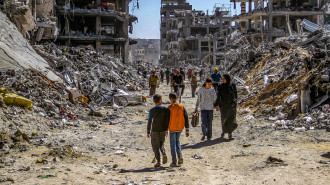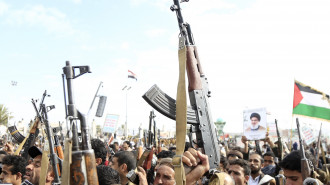Reported secret letters suggest slow warming of US-Iran relations
If confirmed, the secret communication that the Wall Street Journal says has been taking place between Iran’s Ayatollah Ali Khamenei and US President Barack Obama, underlines the importance attached to reaching – or at least being seen as trying to reach – a nuclear deal in both countries.
It also speaks to some of the wider possible consequences.
According to the WSJ, the Iranian leader sent a letter to the White House in the past weeks in response to a communication from Obama back in October. Obama’s letter had suggested that agreement over Iran’s disputed
| Washington may simply see in Tehran a more reliable potential ally in an uncertain region. |
nuclear programme could pave the way for broader cooperation in the region between the two countries, in particular in fighting the Islamic State group (IS, formerly Isis).
Khamenei’s response was “respectful, but non-committal” the WSJ reports, in contrast to a letter sent early in Obama’s first term of which details are also just now beginning to leak. In that letter, the Iranian leader had reportedly outlined the ways in which he said US policies had harmed Iranians over the past six decades.
Neither Tehran nor Washington has officially acknowledged any correspondence. But if confirmed, its existence would suggest that not only are both sides slowly and grudgingly opening up to each other, there may be a shared perception that Obama’s presidency offers the best opening to conclude a deal and set US-Iranian relations on something of an even keel after decades of open hostility and sanctions.
Uneasy allies
Certainly, there seems to be a growing perception in Washington that the Obama administration considers sealing a deal with Iran a priority. There are several reasons for this.
Perhaps the least important is what in America is known as the “legacy question”. Every US president at some point will look to how history will remember him. Almost every American president starts out with dreams of solving the Palestinian-Israeli conflict, for instance, though soon their sights are set lower.
Obama appears to be no exception. Having been unable to clean up properly from the wars of his predecessor – the IS has dragged the US back into Iraq, for instance, while Afghanistan looks decidedly wobbly after a full-but-still-partial US withdrawal.
A deal with Iran that would restore diplomatic ties with the regional powerhouse and satisfactorily allay western (Israeli) fears over Iran’s nuclear ambitions could go some way to secure Obama a place in his country’s foreign policy annals.
But more importantly perhaps are the reasons why the US now appears so keen to deal with Tehran, over the objections of almost all its traditional allies in the region.
Israel has tried, and is continuing its efforts to torpedo prospects for a deal at almost any cost. Israeli Prime Minister Binyamin Netanyahu is even risking relations with the administration by accepting an invitation – not cleared with the White House as protocol demands – to speak to US legislators about the dangers of such a deal.
Washington’s Gulf allies are also not keen. Saudi Arabia is opposed to any deal that does not also curtail what Riyadh sees as Tehran’s designs in the wider region. The UAE has lobbied for years against Iran, cautioning against a lifting of sanctions and warning of the threat of Iranian power to Gulf oil states.
Gulf countries have always been fearful of the Islamic Republic. But those fears turned acute after the US invasion of Iraq and the ascent to power of that country’s majority Shia groups, many of whom rose to prominence at the behest and with the support of Tehran. This has ushered in unprecedented Iranian influence in the Arab world.
Iran watched silent from the sidelines when the US invaded in 2003. Tehran may have been uneasy at having such US might at its doorstep. But it was also not unhappy at seeing the back of Saddam Hussein and his regime, with which it had fought a hugely bloody ten-year war.
Unlikely bedfellows
But Iraq is also proving an unlikely collection points for all these countries. The IS has created strange bedfellows in its opposition. On the one hand, there is Syria, Iran and Russia. On the other, the US and its international alliance that includes Gulf countries and Jordan. All ostensibly are fighting the same enemy.
There is history. Iran cooperated outside official channels with the US when America invaded Afghanistan whose Taliban regime Tehran was no friend of. And IS extremism aside, Washington may simply see in Tehran a more reliable potential ally in a region where uncertainty has been the norm for the past four years.
The Arab Spring uprisings have left many question marks in the region, not least over America’s traditional allies. Moreover, Israel’s repeated and increasingly brutal assaults on Palestinians are, if not quite shaking the US-Israel special relationship, proving a greater and greater embarrassment for Washington.
Still, it all depends on a nuclear deal. This is still some way off. Talks with Britain, China, France, Russia, the United States and Germany – the so-called P5+1 group – have already overshot two deadlines to thrash out agreement since an interim understanding was struck in November 2013.
The P5+1 has now set a March 31 deadline for a political agreement.
It would be followed by a final deal setting out all the technical points of what would be a complex accord by June 30.
There’s much to play for in this enormously complex regional game in which one move never seems to stop having an effect somewhere. Any US-Iranian deal will of necessity have been long, not just in the making, but in the thinking.





 Follow the Middle East's top stories in English at The New Arab on Google News
Follow the Middle East's top stories in English at The New Arab on Google News


